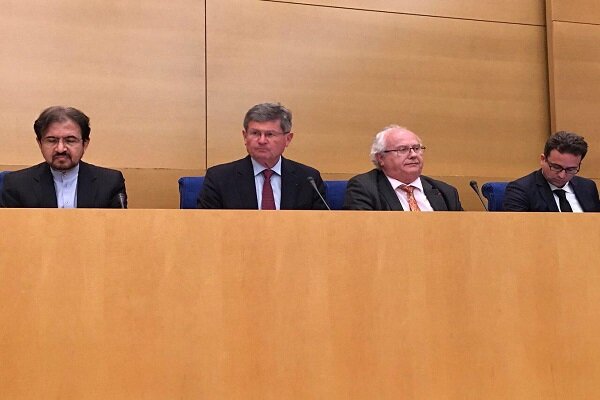Diplomat: Tehran ready to clear up misunderstandings with Arab states

TEHRAN – The Iranian ambassador to Paris has said that Tehran is ready to clear up misunderstandings with certain neighboring Arab countries on the southern shores of the Persian Gulf.
Bahram Qassemi made the remarks while addressing a conference titled “Reducing Tensions in the Persian Gulf” at the French Senate on Monday.
Qassemi underlined the need to adopt collective measures by all countries in the region to guarantee peace and security.
Among the six countries on the southern shores of the Persian Gulf, only Saudi Arabia, the UAE and Bahrain have been trying to demonize Tehran.
“We are and have been ready to interact, negotiate and clear misunderstandings with certain Persian Gulf littoral states,” Qassemi remarked.
Ambassador Qassemi, who recently left his post as spokesman of the Iranian Foreign Ministry to head Iran’s mission in France, criticized some regional states for their failure “to respond to Iran's call to reduce tensions and make efforts to consolidate peace and stability in the region.”
Qassemi was echoing comments by Foreign Minister Mohammad Javad Zarif who during a visit to Iraq on Sunday offered that Iran is ready to sign a regional non-aggression pact with the Persian Gulf states, and that Tehran would welcome any proposals for dialogue and de-escalation.
Recently U.S. President Donald Trump has heightened his anti-Iran campaign, backed by some regional states, on the ground that Iran has been posing threat to U.S. interests in the region as well as those of the neighboring countries.
Trump’s businessman-like campaign bore big fruit as it was reported last week that he has ordered the sale of billions of dollars’ worth of weapons to Saudi Arabia, citing Iranian threats to its arch rival.
“Nuclear weapons have never had any place in the defense doctrine of the Islamic Republic,” Qassemi says.
In 2018 Trump withdrew from the Iran nuclear deal, formally referred to as the Joint Comprehensive Plan of Action (JCPOA), and started reimposing sanctions on Iran’s oil, steel, copper and many other industries.
The months that followed presented Saudi Arabia as a rival to Iran in the global oil market, with assumptions going that the Arab kingdom would replace the slump in supply after the Iran boycott.
In his address to the French Senate, Qassemi further noted that Iran has repeatedly voiced its readiness to sign a non-aggression pact with Persian Gulf Arab states in an effort to “build trust and allay concerns.”
Establishing peace and security in the region could be guaranteed when the interests of all Persian Gulf states are taken into consideration, he said.
Describing the Persian Gulf as “the most important strategic region in the globe,” Qassemi warned that any insecurity and instability in this region would rapidly affect the entire world.
“Iran firmly believes that no country can guarantee its own peace, stability and security single-handedly,” he said.
Lasting peace, the diplomat added, requires collective efforts and firm determination on the part of all regional countries.
Elsewhere, Qassemi stressed the peaceful nature of Iran’s nuclear program, adding that the country is not seeking atomic weapons, which have been clearly banned in a fatwa (religious decree) by Leader of the Islamic Revolution, Ayatollah Ali Khamenei.
“Nuclear weapons have never had any place in the defense doctrine of the Islamic Republic,” he said.
Qassemi pointed to 14 consecutive reports by the International Atomic Energy Agency confirming Tehran’s adherence to its end of the 2015 multinational nuclear deal.
Having access to peaceful nuclear technology — as stipulated in the deal— is Iran’s “inalienable right,” he pointed out.
SP/PA
